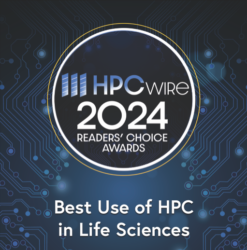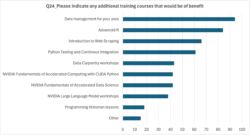In this case study, we hear from Shuyu Li (based in the Department of Economics), who has been utilising BEAR for tackling complex environmental economics problems. As a PhD student in Environmental Economics at the University of Birmingham, I’ve always been fascinated by the ways in which cutting-edge technology can unlock new avenues for research. My work … Continue reading “Unlocking the power of BlueBEAR for social science research”
We’re recruiting more Senior Research Data Scientists
The Research Data Science Service is part of The Institute for Data and AI (IDAI) and the Research Software Group (RSG). We aim to improve and enable state-of-the-art data science research at the University through a range of complementary services. The Service is funded by both IDAI and The Centre for Artificial Intelligence in Government. … Continue reading “We’re recruiting more Senior Research Data Scientists”
Training accurate Machine Learnt Interatomic Potentials (MLIPs) for High Entropy Alloys (HEAs)
In this case study, we hear from Joseph Arnold (based at the School of Metallurgy and Materials), who has been utilising BEAR for developing machine learning-based interatomic potential’s (MLIP). I am a postdoctoral research fellow in the Gurrutxaga-Lerma research group within the School of Metallurgy and Materials, here at the University of Birmingham. My research … Continue reading “Training accurate Machine Learnt Interatomic Potentials (MLIPs) for High Entropy Alloys (HEAs)”
November BEAR Newsletter
Birmingham Environment for Academic Research (BEAR) Newsletter This month, we have exciting news about award-winning research in the international HPCwire awards, plus three posts available within Advanced Research Computing. Further to October’s newsletter, our two student teams for the CIUK Cluster Challenge, return-1 and TED, have now completed challenge 3. Results are still to be … Continue reading “November BEAR Newsletter”
Graduate Systems Engineer vacancy at UoB
If you want to make a difference and are fascinated by how technology works, come and join a leading team responsible for supercomputing and allied services at the University of Birmingham! The Advanced Research Computing team that runs Birmingham Environment for Academic Research (BEAR) services is looking for a graduate (recently graduated or in final … Continue reading “Graduate Systems Engineer vacancy at UoB”
HPC Wire Award 2024 winners!
For the second year running (see previous awards), we are pleased to announce that a research group who use our advanced computing facilities has been recognised as award-winning in the HPCwire 2024 awards! Advanced Research Computing is very proud to provide the BEAR computing facilities to support life changing research at the University, which has … Continue reading “HPC Wire Award 2024 winners!”
October BEAR Newsletter
Birmingham Environment for Academic Research (BEAR) Newsletter We have been busy meeting lots of new PhD researchers this month at their inductions, as well as over 100 members of staff at the Staff Benefits Fair last week. Welcome to those who have just joined the mailing list – it is great to see all the … Continue reading “October BEAR Newsletter”
2024 IT Needs of Active Research Survey results
We were pleased to see a 54% increase in responses to the Pro-Vice Chancellor for Research (PVC-R’s) ‘IT Needs of Active Research Survey 2024’ compared to the previous survey in 2022. Thank you to everyone who took the time to respond and to share their views. The Survey aims to understand the IT you need … Continue reading “2024 IT Needs of Active Research Survey results”
Upcoming maintenance in December and January
As part of the standard maintenance cycle, as usual there will be an extended shutdown of Birmingham Environment for Academic Research (BEAR) Services around the second week of December to carry out major maintenance. This year there are additional major pieces of work to complete which mean more downtime than in previous years: The complexity … Continue reading “Upcoming maintenance in December and January”
Building professional skills via an internship
Back in Autumn 2023, we were pleased to have an intern join us for 3 months for their Professional Internship for PhD Students (PIPS) placement, as part of the Midlands Integrative Biosciences Training Partnership (MIBTP). You can find out what PhD student Kirsty McCready got up to in the article below. The MIBTP is a … Continue reading “Building professional skills via an internship”









